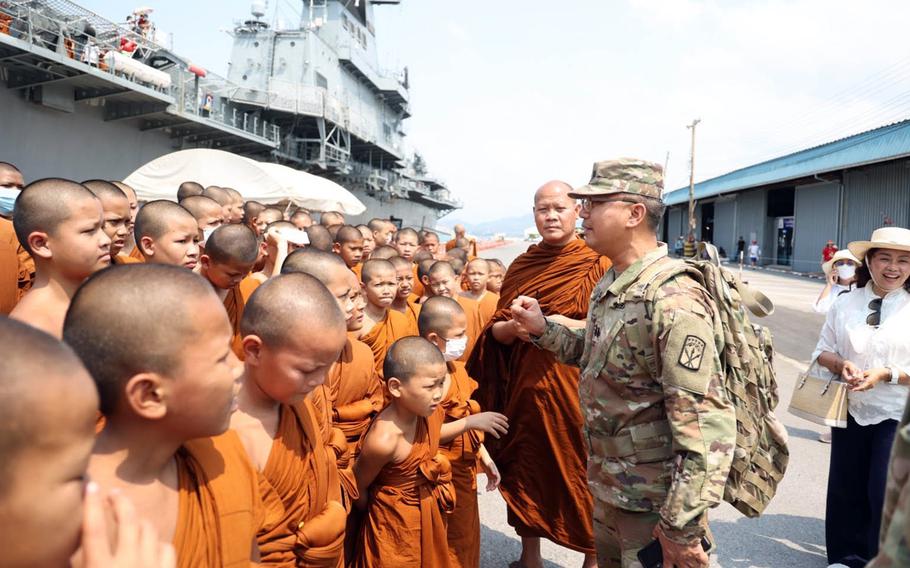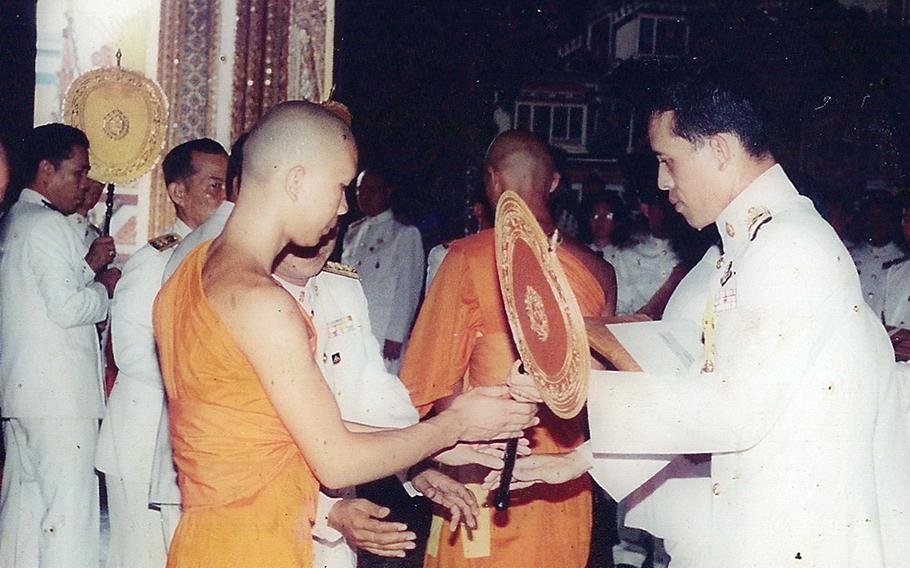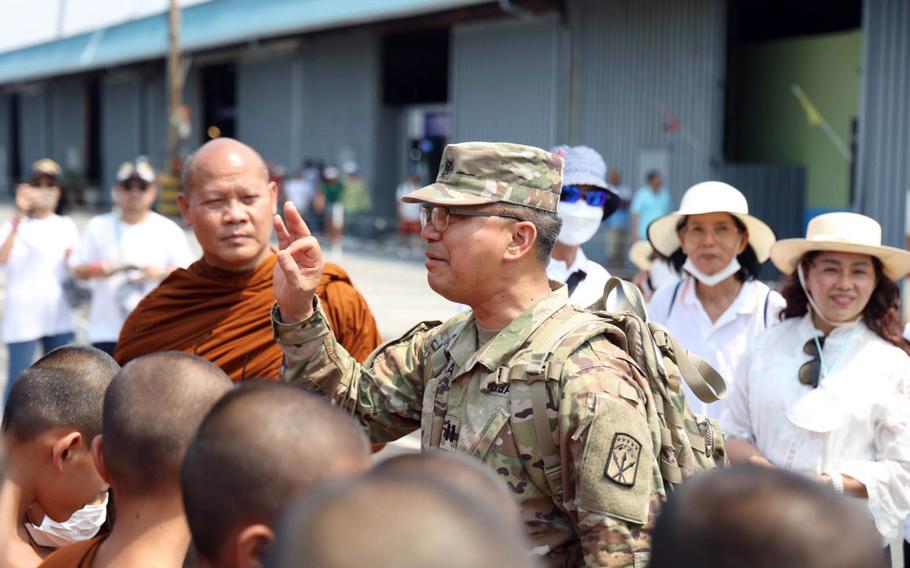
U.S. Army Chaplain (Capt.) Songkran Waiyaka, a former Buddhist monk from Thailand, speaks with novice monks during a Cobra Gold cultural exchange at the port in Sattahip, Thailand. (U.S. Army)
RAYONG, Thailand — Seated in a cantina at a Thai navy base on Friday, a U.S. Army captain stood out for the cap insignia rarely seen on a military uniform — the Buddhist wheel of dharma.
Of more than 3,000 religious leaders in the Army, Chaplain (Capt.) Songkran Waiyaka is among the 10 Buddhists, a rarity that leads many soldiers to ask about the insignia on his hat, which can generate some confusion among anyone unfamiliar with Buddhism.
“When I was a second lieutenant, a captain saluted me,” Waiyaka said jokingly. “That’s why this (wheel of dharma) is my tool to interact with soldiers.”
The insignia represents the teachings of the Buddha, or the dharma.
Assigned to the 53rd Transportation Battalion at Joint Base Lewis-McChord, Wash., is back in his native Thailand for Cobra Gold, one of Asia’s largest military exercises.
Waiyaka is serving in a variety of roles here, from translator to a cultural ambassador between the U.S. and Thai militaries. The experience, he said, has been rich and diverse — one he views as an invaluable aspect of his chaplaincy.
‘Maintain the mind’
Born into a family of farmers in northern Thailand’s Chiang Rai province, Waiyaka grew up about 600 miles north of the Rayong base where elements of Cobra Gold are taking place this week.
A novice monk at age 13, he was fully ordained a decade later. Now 52, Waiyaka said he became a monk for the challenge of it, the same reason he joined the Army.
Buddhist novices, he explained, are bound by 10 precepts, or commands, such as abstaining from alcohol, eating after noon or accepting money.
“That was until I hit 20 years old; then I had 227 (precepts),” he said with a laugh.

Then-Crown Prince Maha Vajiralongkorn, now King of Thailand, right, bestows Songkran Waiyaka with the sixth-level rank of accomplishment in Pali language studies in 1993. (Songkran Waiyaka)
Waiyaka said he doesn’t struggle to work with his battalion, composed of mostly Christian soldiers. He often refers troops to other chaplains for some services, including weddings, and uses his position to promote mindfulness and mental wellness.
“My first assignment was at Fort Stewart in Georgia with the 703rd Brigade Support Battalion, and the slogan of my battalion was to ‘maintain the line,’ ” he said. “I talked to my commander and said, ‘Sir, maintain the line is not enough.’ I wanted to add ‘maintain the mind.’ ”
Waiyaka said mindfulness — an important aspect of Buddhism that essentially means living in the moment and being self-aware of thoughts and emotions — is important for anyone, but it’s especially critical for soldiers.
“If the soldier is weak, that’s a no-go,” he said. “If they have a big six pack, big muscles, but their mind is weak, that’s no good.”
To facilitate this, Waiyaka said he’s incorporated yoga into his command’s physical training regimen.
‘Thai all day long’
After 10 years as a monk in Thailand, Waiyaka left to serve a Buddhist community in Fremont, Calif., as part of the Wat Buddhanusorn temple for another decade. But eventually, he said, the experience wasn’t helping him grow the way he hoped.
“After I hit 20 years, I popped smoke from the Buddhist monastery because I didn’t fulfill why I was in America,” he said. “Pop smoke,” a military term used to call for extraction by air, is sometimes used in the Army as a euphemism for departure.
“I was serving a Thai Buddhist community, eating Thai food and speaking Thai all day long. I wanted to try something different,” he said.
Once he joined the Army, Waiyaka said he immediately saw similarities between his past and present lives. Both are vocations that demand commitment and sacrifice; he said the difference between the two is the nature of that sacrifice.
“As a Buddhist monk, I had no hair, had no eyebrows, had no civilian clothes,” he said. “No alcohol, no girlfriend or wife.”

U.S. Army Chaplain (Capt.) Songkran Waiyaka shows the chin mudra, a Buddhist hand gesture, to novice monks at the port in Sattahip, Thailand, during exercise Cobra Gold. (U.S. Army)
As a chaplain, the lay Buddhist minister is beholden to just five precepts — prohibitions on killing, stealing, lying, intoxication and sexual misconduct.
“When I joined the Army, I found that I’ve done more than when I was a monk in America for 11 years,” he said.
During his journey from monk to chaplain, Waiyaka also found love, something denied him as a monk. While studying in 2014 for his master’s degree ahead of chaplain training, he met his future wife, Prisana Suchatsuthatham.
Now with 13 years in the Army, Waiyaka is not far from retirement. When he does depart, there’s at least one more challenge waiting for him.
“I’m going to pop smoke permanently to enjoy life after,” he said. “I really want to write about my life, a book. You know what, I even want Steven Spielberg to make a movie about my life.”